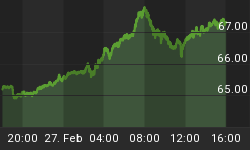Last week Standard and Poor's announced that the AAA credit outlook of the United Kingdom was lowered to "negative" from "stable." The action caused many in the US, including Bill Gross, to impugn the United States' AAA credit rating and wonder if the same devaluation should be applicable here.
If the reasoning behind S&P's decision to call into question Britain's ability to repay debt is due to their budget deficit this year being 175 billion pounds ($273 billion), or 12.4% of gross domestic product for this year alone, then America's budget deficit ($1.84 trillion and approaching 13% of GDP) should yield the same result. Investors agreed with that reasoning and sent the yield on the 10 year note soaring to 3.43% during Friday's trading session, up over 90 bps from the Fed's March 18th announcement to purchase $300 billion in treasuries.
Those rising yields, a dollar which has dropped 10% from the March highs and rising commodity prices are forcing the Fed and Administration to take a stand. Do they wish to continue their efforts of artificially engineering a recovery by deficit spending and monetary stimulus or will they chose to return to a real economy -- one which pursues policies that allows rates to rise and increases the purchasing power of our currency?
The government is now hopefully learning a valuable lesson. A country can't manipulate interest rates lower and stimulate the economy by piling on an insurmountable level of debt without consequences. The problem they face is clear. The incipient healing of the economy hinges on the continuation of very low borrowing costs for the consumer and government, as well as an economy that enjoys price stability. Record levels of debt require interest costs to remain low otherwise debt service becomes intractable. On the other hand, the massive build up in the monetary base and levels of debt demand for commodity prices to rise, the dollar to fall and bond yields to soar.
The point is they just can't have it both ways. The government will have to decide to either step up their purchases of coupons in a direct assault on the bond vigilantes or acquiesce and allow rates to rise above inflation. The more long term debt they purchase by expanding money supply, the more inflation they will create. Therefore, the higher those yields must eventually rise. If they were to have a change of heart and allow the free market to work, rates would rise initially because they have been suppressed for so long. But although that would cause an extreme amount of economic pain in the short term, it is the only path that leads toward the long term health and viability of the country.
This is a critical time in our nation's history. The bond, foreign exchange and commodity markets are forcing government's hand. Comments made by Timothy Geithner and Alan Blinder last week give us a clue as to what road they will take. The Treasury Secretary and former Vice Chair of the Federal Reserve clearly indicated that it would be a serious problem if government exited its prodigal spending too soon. If that wrong decision is made and the government doubles down on its losing bet to artificially control interest rates, we face an economic environment that will be stigmatized by stagflation as far as the eye can see.
If higher inflation, more taxes, and debt lead to economic prosperity the economy is right on course. If however, you believe that a sound currency, low inflation, les debt and lower taxes lead to productivity gains -- the only real way to grow an economy -- you may have to wait until the next life.
*Tired of paying fees while your account value plummets? Learn about our new performance-based pricing.
Be sure to listen in on my Mid-Week Reality Check
Follow me on Twitter: http://twitter.com/michaelpento















